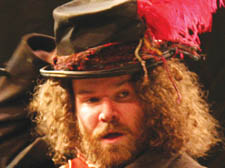|
|
 |
| |

Phil Dealey as Autolycus |
The Bard’s Tale with a moral word of warning
THE WINTER'S TALE
Courtyard Theatre
WITH Ewan McGregor and Chiwetel Ejiofor currently reviving Othello, Jude Law set to take on Hamlet and recent turns from Sir Ian McKellen and Patrick Stewart as Lear and Macbeth respectively, Shakespeare is in rude health on the London stage.
The Steam Industry’s Winter’s Tale proves quality productions of the Bard’s work are not solely the province of high profile, star-driven vehicles.
Director Phil Wilmott is not afraid to meddle with the play either; transferring a section of the Fourth Act to the beginning provides a useful narrative frame for the action, setting the first half of the play as a tale told by portly raconteur Autolycus, strongly played with wit and excellent delivery by Phil Sealey.
It also allows the spectating actors to morph into the courtly roles the first half demands, in a well-worked in-the-round staging that emphasises the fluid boundaries between players and audience.
The play’s apposition of classical tragedy in the Kingdom of Sicilia and the later pastoral comedy in the Kingdom of Bohemia make it a challenging proposition.
Gwilym Lloyd’s Leontes dominates the first half, but his performance is overdriven; sustained at a frenzied, breathless pitch of diseased jealousy that obviates any nuance or inflection.
It is not an easy role; his suspicion is written so it comes almost from nowhere, and an actor must try to smooth this textual disjuncture.
The suspicion that his wife Hermione (an emotive Natasha Seale) might be conducting an affair with Polixines (Simon de Deney – strong, though his later “rural” accent leaves much to be desired), drives him to the rash action that loses him daughter and wife, until the play’s eventual reconciliations.
Unlike Othello, put on the rack by Iago’s insinuations, Leontes’ suspicions are dredged up from his own tortured mind. Lloyd eventually finds the right pitch with the dignified penitence of his reappearance later on, greying and bowed to his own trespasses.
Against this central performance Matthew Ward’s Camillo seems pale, stooped and enervated by the impossibility of his situation, repelled by the tyrant but bound by duty.
Conversely, Ursula Mohan excels as Paulina, giving an authoritative performance, a measured and soothing presence in the maelstrom of the opening Acts, and a moral guide up to and through the genuinely moving closing scene.
Until January 27
0870 163 0717 |

|
 |
|
|
 |
|



